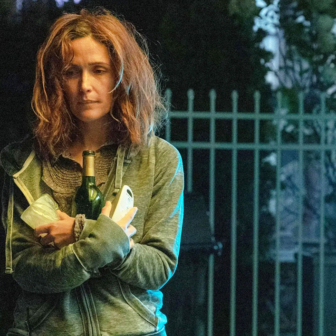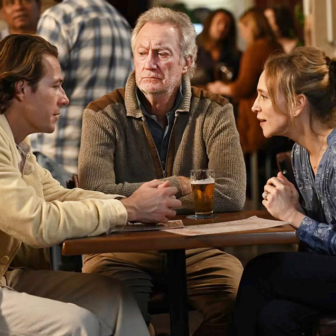A family getting together (sometimes with the odd friend thrown in) is surely one of the most enduring premises in film history. Last month I wrote about the recent Australian exemplar of this narrative starter, Palm Beach; and since then Downton Abbey, the feature-film version of the wildly popular TV series, has shown us how posh English families conduct themselves. But best of all at the moment is the American–Chinese production, Lulu Wang’s The Farewell. It may not have attracted as much audience attention as Downton Abbey, but it certainly deserved more.
No author was ever more preoccupied with families than Ivy Compton-Burnett. In her brilliant talkfests, family ties could never be relied on as a bulwark against mounting tensions, or worse. In fact, she once claimed that more harm is done in the name of the family than of any other institution. Well, this may be true; most of what she said was; but while The Farewell certainly has some tense moments, what emerges is essentially a benign concern for a family’s matriarch.
The film opens with a telephone call from New York–based Chinese student Billi (Awkwafina) to her grandmother in Changchun, Nai Nai (Shuzhen Zhao). The two of them seem to have a very warm relationship undiminished by intercontinental separation. But what sets the narrative in motion is the news received by Billi’s parents, Haiyan (Tzi Ma) and Lu Jian (Diana Lin), that Nai Nai — who is Haiyan’s mother — has been diagnosed with cancer and may have only a very short time to live.
To protect Nai Nai from this knowledge in what they believe to be her final month, the family plans a hasty wedding between her only grandson, Hao Hao (Han Chen), and his recently acquired girlfriend, Aiko (Aoi Mizuhara). Billi’s parents, fearful that Billi won’t be able to control her distress, try to persuade her not to accompany them to China for the wedding. But Billi, who is very Americanised, believes that she is perfectly able to tell the odd, more or less harmless, lie, and follows her parents to Changchun. In one of the film’s many engaging moments of gentle humour, a surprised Nai Nai asks her, “Did you fly?” “No, I swam,” comes her reply.
Soon the family gathers for a meal. A gathering like this — as in, say, the very different Palm Beach — seems to announce a unity, a harmony, that we feel is likely to become strained. Nai Nai, still unaware of how serious things are, blames her sister for telling the distant family members that she’s been unwell; the young soon-to-be-weds seem constrained by the circumstance that is pushing them towards marriage; Billi’s mother doesn’t quite join in the conviviality that Nai Nai exudes. But there’s nothing like the vicious outbreak that happens in Palm Beach.
What does emerge is the easy, affectionate rapport between Billi and her grandmother, including a scene in which the latter trains Billi in what I suspect are called “wellness” exercises, to be echoed in the film’s last moments. Director Wang has secured superb performances from Zhao Shuzhen and Awkwafina in roles that become central to the film’s texture and tone. This is not a film with a conventional cause-and-effect narrative structure, but one that depends on closely observing what goes on among members of a family. (I am reminded of the 2005 US drama of family tensions, Phil Morrison’s Junebug, a film of similar tonal astuteness.)
The Farewell may seem to be animated by the approaching wedding but its real purpose lies in observing how people react in shifting situations. Anna Franquesa Solano’s superb cinematography fluently locates their reactions, her framing of Billi’s affectless gaze at the daunting apartment blocks she passes, and fetches up at, on arrival at Changchun very effectively showing how much more at home she felt in the opening scenes in New York streets.
While the film is unerring in its revelation of its characters’ interactions, its texture is also enriched by an ongoing concern with ideas, though it avoids becoming merely didactic. The “lie” that sets the whole thing in motion — the wedding — becomes more than a mere plot device. Echoing the words of the film’s subtitle, “based on an actual lie,” contrasts are made between Nai Nai’s sister’s effortless, well-intended deceit, Billi’s desire to tell the truth, and the claim of one doctor that “it’s a good lie.” Through such reactions, the film canvasses the complex morality that this kind of untruth may involve, and its consequences
The Farewell is one of the richest films of the year, engaging our attention through its characters and how they react to each other and to the “lie” at its heart, and by touching on the accepted mores of East and West as understood by those who live on opposite sides of the Pacific. You don’t have to agree with what one character suggests, that the West is only interested in individuals while the East views family as part of a whole scene: it is simply an aspect of the thinking and lived experience of Wang’s people.
The no doubt eagerly anticipated film version of Downton Abbey offers another kind of family whose members are sometimes at odds with each other. Though I’m not a dedicated fan of the series, I should in fairness add that the film passes the time (two hours) easily enough, perhaps above all because of its great cast. Most of them are repeating the roles they played in the series, though a few are entering the sacred world of Downton Abbey for the first time.
When a royal visit is announced, the family is of course excited, as are the downstairs staff. But the servants find they are to be replaced by the royal entourage under the smugly superior Wilson (David Haig), and their services will not be required during the visit. This leads to some farcically contrived plotting, and indeed the film as a whole is overcrowded with incident and characters.
In the end, it’s really all about hierarchy, above and below stairs. Wilson makes it plain that his own underlings know their place, while upstairs there is never any question that Maggie Smith’s Countess of Grantham sits and sniffs at the top of the ladder, even more elevated than her lord-of-the-manor son, the earl (Hugh Bonneville), and certainly above his American wife (Elizabeth McGovern) and the Baroness Isobel (Penelope Wilton), while the earl’s Irish son-in-law is clearly the lowest-placed at the table.
If you want merely to pass two hours more or less painlessly, Downton Abbey may fit the bill. But an hour and a half spent in the company of The Farewell is time spent with what may just be a great film. •




